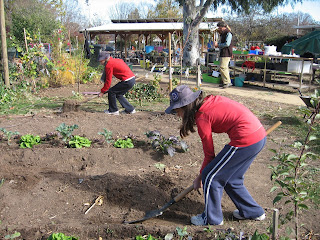Encouraging active food citizens

First published in Canberra's Child , August 2013 At what age should kids be in the kitchen using sharp knives and a perilously hot stove? At what age should children take part in decisions about what’s for dinner and how it’s made? My hunch is too often children are limited by pre-conceived ideas about what's safe and what's appropriate. In our crazy-busy and harried parenting lives, I am grateful for the invitation to have my children take part in a kitchen garden program (complete with composts and chooks) at their primary school in Canberra, with its spill-on effects. Having the kids become ‘active food citizens’ is not without its risks or downsides. Meals take longer to prepare, basic tasks become full of human drama and the kitchen gets messier (I'll admit that haven’t let go entirely). But I have found that engaged children are more likely to appreciate their food. My nine-year old son has always been interested in cooking and began making porridge for